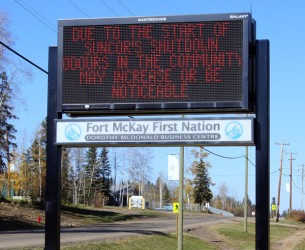Article Origin
Volume
Issue
Year
On Sept. 29, Fort McKay First Nation and Fort McKay Métis Nation, in partnership with Alberta Health and Wellness and Alberta Aboriginal Relations, announced their shared commitment to work together on a community health assessment for the Fort McKay community.
“This community health assessment is an historical first for Alberta,” said Gene Zwozdesky, minister of Health and Wellness.
Zwozdesky had been attending meetings to set up a health study like this in the area since May of 2008, however, those meetings were not with Fort McKay. Instead, they took place between the minister and the leadership of the Fort Chipewyan area.
It was in Fort Chipewyan that health concerns were raised as far back as 2001, and many from the area wanted those concerns investigated for possible links to the oil sands industry.
Health concerns in Fort Chipewyan grew to the point that the Minister of Aboriginal Relations and the Alberta government were forced to take notice.
On the Aboriginal Relations section of the Alberta government Web site there is a stand-alone section entitled “Fort Chipewyan.” Inside it states, “The Government of Alberta acknowledges (Fort Chipewyan’s) concerns on health and environment issues and is taking action to help address them.
“Officials from Aboriginal Relations, Health and Wellness, and Environment have visited Fort Chipewyan many times to build relationships, hear concerns and collaborate on solutions.”
One of the proposed solutions was the “development of a community health study, led by Alberta Health and Wellness.” This is basically the same study as the one now set to take place in Fort McKay.
The oil sands development in the Fort McKay area relies heavily on the Athabasca River, which flows through Fort McKay on its way to Lake Athabasca, Fort Chipewyan’s main source of water and fish.
Some people in the area are wondering how Fort Chipewyan could still be without a health study and how the Alberta government could switch its focus from one community to another.
When asked about the switch, a representative from Alberta Health and Wellness stated simply, “we were able to come to an agreement with Fort McKay first.”
The First Nations of the Fort Chipewyan area point to politics for putting the discussions about the health study on hold.
The chief of Athabasca Chipewyan First Nation was unavailable for comment due to upcoming elections in that community. A representative of Mikisew Cree First Nation said “we are in the works on that (health study)...but we are going into a new chief and council so there is a period of catching up.”
The former chief of Mikisew Cree Nation, George Poitras, was available for comment, however, and said there are other reasons why the Fort Chipewyan study got side-stepped.
“The biggest concern the community had was the fact that the Alberta government did not want to look at the cancer issue whatsoever. The Alberta government has publicly stated that they see no concerns with cancers in Fort Chipewyan; that, despite their own study in February 2009 that concluded there is 30 per cent elevated levels of cancers in Fort Chipewyan.”
Poitras was concerned about bias as well, stating “If the study is tied to funding from either the oil companies or the government of Alberta, there is a great likelihood of bias... they (the Alberta government) will attempt to control what the study question is, how the study is undertaken, any outcome of the study, and most definitely how the study outcome is communicated to the public. This has been the experience of Fort Chipewyan with the 2009 Alberta Cancer Board Study.”
A representative of Alberta Aboriginal Relations said that the Fort McKay study is “community driven” and that the community will decide what they want the study to entail.
While there is some direct mention of surveys being conducted to “determine the health priorities of Fort McKay residents” most of the actual letter of intent for the study says that everything will be done with input from representatives on all sides, as highlighted in clauses like “to jointly design and implement appropriate community health assessment activities to identify the health issues and concerns of the residents of the community of Fort McKay...”
The committee over-seeing the study is to be made up of an equal number of representatives from Fort McKay and the Alberta government.
Dr. John O’Conner is the doctor who initially helped bring the high rates of cancer and other health issues in the Fort Chipewyan area to public scrutiny. He now works in Fort McKay and is in a unique position to comment.
For his part, Dr. O’Conner feels that “the health study needs to involve Fort Chip along with Fort McKay. This on account of the physical connection [the Athabasca] and the close family links both communities have with each other.”
“Given the scientific findings of the significant environmental impact of the tar sands on the lands and water downstream, and the lack of provincial and federal government monitoring of the industry (despite their claims to the contrary), and the documented health issues that are begging investigation, I firmly believe both communities need to be studied, and with some urgency.”
- 3694 views

